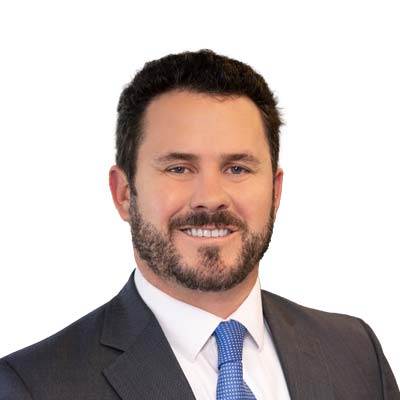My introduction to the world of finance came at my hometown clubhouse in southern California. I was in my 20s, fresh out of college, and trying to raise funds for my budding career as a pro golfer. I needed cash for tournament fees and travel expenses, and a couple of guys — an accountant and a local businessman — agreed to help.
Together, they opened an LLC for me, helped me fundraise by selling a portion of my future golf earnings, and got me the cash I needed. Frankly, I didn’t know what all of that meant. From what I understood, my backers earned payouts if I kept winning and, well, I wasn’t worried about losing, so that part didn’t matter. All I knew was that I needed money to go to Q School, the annual qualifying tournaments held on the pro golf circuit, and that these guys believed in me.
They were investing in my career. I was going pro.
For me, a career in golf didn’t seem possible, it seemed probable. When you’re playing golf like I was, you have to believe you’re going to be the best in the world.
Whether or not it’s true, it’s what you tell yourself: “I’m winning. I’m good enough to go to the next level. I’m going to be the next Tiger Woods.” As low as those odds are, you have to tell yourself that. Otherwise, why are you trying?
I believed I was going to make it. I was chasing perfection, and I was winning.

Life on the Tour
At the pro level, golf is a game of failure. You’re constantly losing. If you win one out of 20 tournaments, it’s an amazing year. Tiger Woods, one of the greatest golfers of all time, won 23% of his PGA Tour starts.
Most people have no idea what it's like to be on tour. It’s so hard. You’re digging deep to grind it out, even when you think you have nothing going for you.
I started my professional golf career on the Canadian Tour, which is now called the PGA Tour Canada. It’s kind of like AA baseball, but it is a real tour. Most of the golfers have sponsors and you get Official World Golf Ranking points. It’s on TV and you’re playing with caddies, just like on the PGA Tour.
 Even so, money was a constant worry for almost everyone. Out on the tour, four of us would be splitting a hotel room with two beds, we would pile into one rental car, share meals, and none of us were traveling with a coach. We’d have to print off MapQuest directions to get from tournament to tournament and hope we didn’t make a wrong turn.
Even so, money was a constant worry for almost everyone. Out on the tour, four of us would be splitting a hotel room with two beds, we would pile into one rental car, share meals, and none of us were traveling with a coach. We’d have to print off MapQuest directions to get from tournament to tournament and hope we didn’t make a wrong turn.
Each of us was on our own.
Every tournament mattered. You had to make the cut, to make a check, to make it to the next tournament. Miss a cut? That was it. You had to go home. There was no money for mistakes.
When I was on tour, I would write my shareholders a letter every week, telling them where I was and how I was playing. It was basically my start in sales.
It was also a reality check.
In one of my best tournaments, I beat 130 people and came in 10th place. I made $1,800, but I still spent $2,400 for the week. I started to realize that no matter how much hard work I put into my golf game, everyone else was putting in the same hard work, too.
My pro career stretched for three years, but my sponsors dried up with the 2008 financial crisis. Some of the tours folded. It was the worst time to be asking people for money to go play golf.
I had to look for something else, even though I had zero job experience and was looking for work in the worst possible market.
From the Fairway to Finance

I heard about an opportunity in San Francisco. I drove north, got the job, and started working. It was a job nobody really wanted: 50 door knocks a day, and 100 telemarketing calls a day, selling retirement and payroll plans.
As an athlete, though, it was easy for me. A manager was basically the same as a coach. My manager would say, “Do this, say that, and you’ll do well.”
I worked my way up for two years before Brian Parker, one of the founders of EP Wealth Advisors, asked me to come work with him. He wanted me to get my CFP® certification right away, so I passed that along with my Series 6, 63, and 65. I was off and running.
I realized that there are some similarities between golf and financial advice.
Both deal with the pursuit of perfection without achieving it. Whether it’s a tough round of golf, a down market, or a meeting that’s not going well, you have to grind it out. You’re trying as hard as you can and giving 110%.
With financial advice, you do all you can to mitigate the rough patches. You diversify, try to beat the indices, move to cash, set up a retirement plan, or do tax-loss harvesting. You set up a donation plan and exhaust everything you can to earn your keep. It’s not fun for anyone when the market is cratering, but people respect the effort.
 My experience with sports also taught me something about financial advice: If you make 50 calls a day and I make 100, I’m probably going to do a little better. With financial advice, hard work pays off. Everyone wants a magic bullet, but the harder you work, the better you get. It sounds basic, but it’s true.
My experience with sports also taught me something about financial advice: If you make 50 calls a day and I make 100, I’m probably going to do a little better. With financial advice, hard work pays off. Everyone wants a magic bullet, but the harder you work, the better you get. It sounds basic, but it’s true.
I still love golf. One of my friends is a pro golfer, so I’ve been to Augusta National a few times and stayed in the Butler Cabin. I’ve stood at those prolific greens and looked out over the course. When those things are happening, you’re stunned. It feels surreal. Both of us realize how far we’ve come from those mini-tour days
There’s a closeness that sports have brought to my life. Whether it’s playing with my dad at the country club, getting the support of my local club when I went pro, or enjoying a round of golf with a client or a colleague, it’s taught me how to face adversity and how to succeed.
A lot of advisors will talk about their golf game. But golf represents so much more than bragging rights or a strategy for dealmaking.
Golf is the discipline that comes with good habits. It brings people together. It’s about constantly looking for ways to improve.
It's a game where there is a constant pursuit of perfection.
Sports and advising aren’t easy. They take a lot of hard work, but they also reward those who put in the effort.
EP Wealth Advisors and its employees are not affiliated with TradePMR. No compensation was paid to the author for this article. This article reflects this the author's experience. Your experience may vary.

